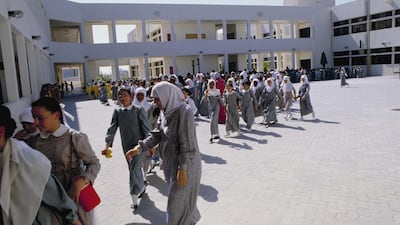Grade 1 classes at all public schools in the UAE will be co-educational from September following a decision that has been welcomed by educators but drawn mixed reactions from parents.
The Ministry of Education said all public schools will now teach boys and girls together from first to fifth grade.
The changes will be implemented on a yearly basis, beginning with Grade 1 pupils in the upcoming academic year.
Many private schools typically have mixed classrooms but public schools still segregate boys and girls. The ministry has not revealed further details about the plan.
Sameera Al Ameri, an Emirati parent, said she sees the mingling as a positive way to teach children how to deal with the opposite sex at a young age.
“Life is changing, and they will end up mixing anyway in university or at work,” the mother of nine said.
“But parents will reject this idea in the beginning and I expect some to withdraw their daughters from school.”
Ms Al Ameri’s son attends Al Qemma School in Al Shamkha, which already teaches mixed classes for boys and girls from grades 1 to 3. Grades 5 and 6 pupils are taught in segregated classrooms and have different break times but share the same building.
“When they decided to mix their classes with girls, my son Zayed wanted to leave the school. He said, ‘We don’t want girls with us’. At that age you’ll find the boys more reluctant about sharing classrooms with girls,” she said.
When the change was announced at her son’s school four years ago – a decision made because not enough pupils were enrolled to warrant segregation – many transferred their daughters to another school.
However, the model proved successful in the long run and more conservative parents grew to accept the change, she said.
________________
Read more:
Mixed feelings over mixed school
My Life: On gender segregation
Girls continue to outperform boys in UAE schools
________________
Ms Al Ameri said parents may worry the boys may hit the girls.
“Boys at that age are very mischievous, but whoever was raised right at home will act ethically wherever you put him.”
Fatima Al Ameri, an Emirati mother of two girls and two boys who attend public schools between KG2 and Grade 8, said the decision will prove “100 per cent negative and has no benefits whatsoever”.
“We don’t mind changes if it will have a positive outcome but this will only result in worrying us parents.”
Ms Al Ameri said mothers would worry about their daughters until they returned home, fearing they will be attacked by a boy in class.
“Our society’s mentality is different than that of the West. Boys are taught that they are men and tough. If a girl starts to argue with him, he will probably hit her.”
She said that even if the motivation behind the move was to teach both sexes to work together, the pupils would be segregated again after fifth grade, “so what is the point?”
Judith Finnemore, of Focal Point Management Consultancy, said having girls in the classroom could help to reduce instances of mischievous behaviour among boys.
"It’s going to be a very big shift and it’s going to be quite difficult for some people to get their heads around this. There might be an exodus of parents taking their children out of government school and into private schools,” she said.
“There is no good reason to segregate children in Grade 1. The girls’ better study habits will hopefully rub off on the boys.
“We see badly behaved boys because there is no one socialising them,” said Ms Finnemore, suggesting that classes be mixed until the end of primary school.
“Girls mature faster and socialise more quickly, so they are an ameliorating influence on boys.”
Ali Al Sharaf, a former head of school and educator based in Dubai, said having co-ed classes is healthy but he anticipated mixed reactions from parents.
“They [the authorities] are not going to take this step without studying the situation. They studied it and they know that they will face many challenges. They must be sure that this will be a success. Parents might pose a challenge and we have to change the mentality and let them understand the school,” he said.
Other Arab countries like Syria, Morocco and Egypt all have mixed classrooms already, he said.
Aishah Alyammahi, principal of Al Asayel School, said the mingling would be positive in the long run, teaching pupils strong communication skills that will set them up for life.
“Children who grow up together, learn how to communicate with each other, respect each other and work together.”

